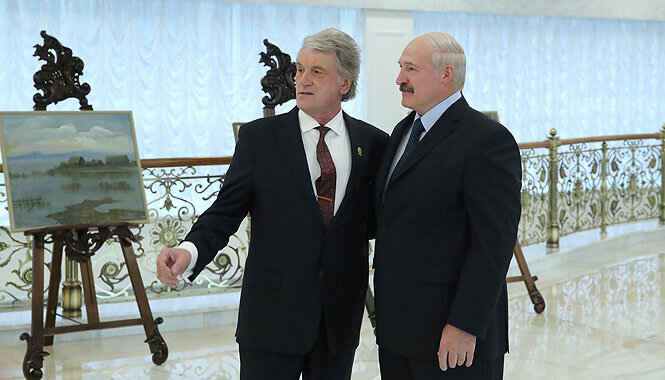Meeting with former Ukrainian President Viktor Yushchenko
- 1
- 4:33
Belarus President Aleksandr Lukashenko met with Ukrainian statesman and political figure, former president of Ukraine (2005-2010) Viktor Yushchenko in Minsk on 8 October.
“There are many issues that I am ready to discuss with you, including the position of Ukraine in the CIS. Ukraine has announced its withdrawal from the CIS. It has not been officially done yet, however. At the recent Dushanbe summit the Ukrainian flag was present as always. I understand that this is not a one-day process. Probably, for Ukraine it is also disadvantageous to break all ties with our states separately and the CIS in general. You know my point of view. I have always said that it is easier to withdraw than to join the union again. This is, however, Ukraine’s sovereign right and we have to respect it,” the Belarusian leader said.
“You know my stance on the events in Ukraine. We do not want to interfere with Ukraine’s affairs. It is not our business at all. We, however, will talk about it as the events that are taking place in Ukraine influence us a lot. Especially it pertains to the inflow of weapons through the Ukrainian border. We have seized a lot of weapons lately,” said the head of state.
In his words, there have been cases when weapons from Ukraine made their way to Belarus through Russia. “We have recorded such facts when investigating criminal cases. I spoke with the Russian president about it. This matter worries us a lot,” the President of Belarus said.
“But it could have been much worse. And if we speak frankly, there is no such animosity against Belarusians on the part of Ukrainians. There is no clash of people's opinions and peoples. This is the most important thing. This is encouraging. This is the basis of our good relations. There are a lot of problems, and I am willing to discuss these problems,” Aleksandr Lukashenko said.
Speaking of bilateral relations between Belarus and Ukraine, the head of state recalled about Viktor Yushchenko’s presidency. “When one compares those years with the current times. I am not talking about Ukraine and Belarus only. I mean our relations in the post-Soviet space. Of course, it was not the worst of times, especially between our states. With all differences in points of view we would always find consensus and would build our relationship. Not only us. No matter how hard it could be, we would find common ground with the Russian Federation, mutually acceptable solutions with other states. Many things happened but we would always reach a positive result. The trade turnover rose rapidly back then. The trade is not bad today either, growing by 20-30%. By the way, it is even higher in the CIS. The trade has been on the rise for the second year in a row after a serious setback. But today we have solid growth in the Eurasian Economic Union and in the CIS as a whole. We see the same things happening in Ukraine,” the head of state noted.

According to Viktor Yushchenko, bilateral relations with Belarus have always been ideal both at the political and people’s levels. “We have always found mutual understanding in the most complicated matters. What is happening today in Ukraine and not only there is a big test and a huge problem for us as a nation, the country, our neighbors, and Europe,” the former president of Ukraine said.
In his words, on the one hand, people in Ukraine have become more consolidated than they were some 5-10 years ago.
On the other hand, the territorial issue is very complicated, Viktor Yushchenko said stressing that there is no simple one-component solution. “Clearly, the matter is about a long-term process,” said the former president.
He noted that amid all these events the political life in Ukraine is also turbulent because many parties use this situation for their political ends. Viktor Yushchenko expressed the view that for this reason, the upcoming presidential election in Ukraine may see the largest number of candidates in the country's history. He noted that the charged political debate is often not good for the situation and its stabilization but this helps shape the national identity of the Ukrainian people.